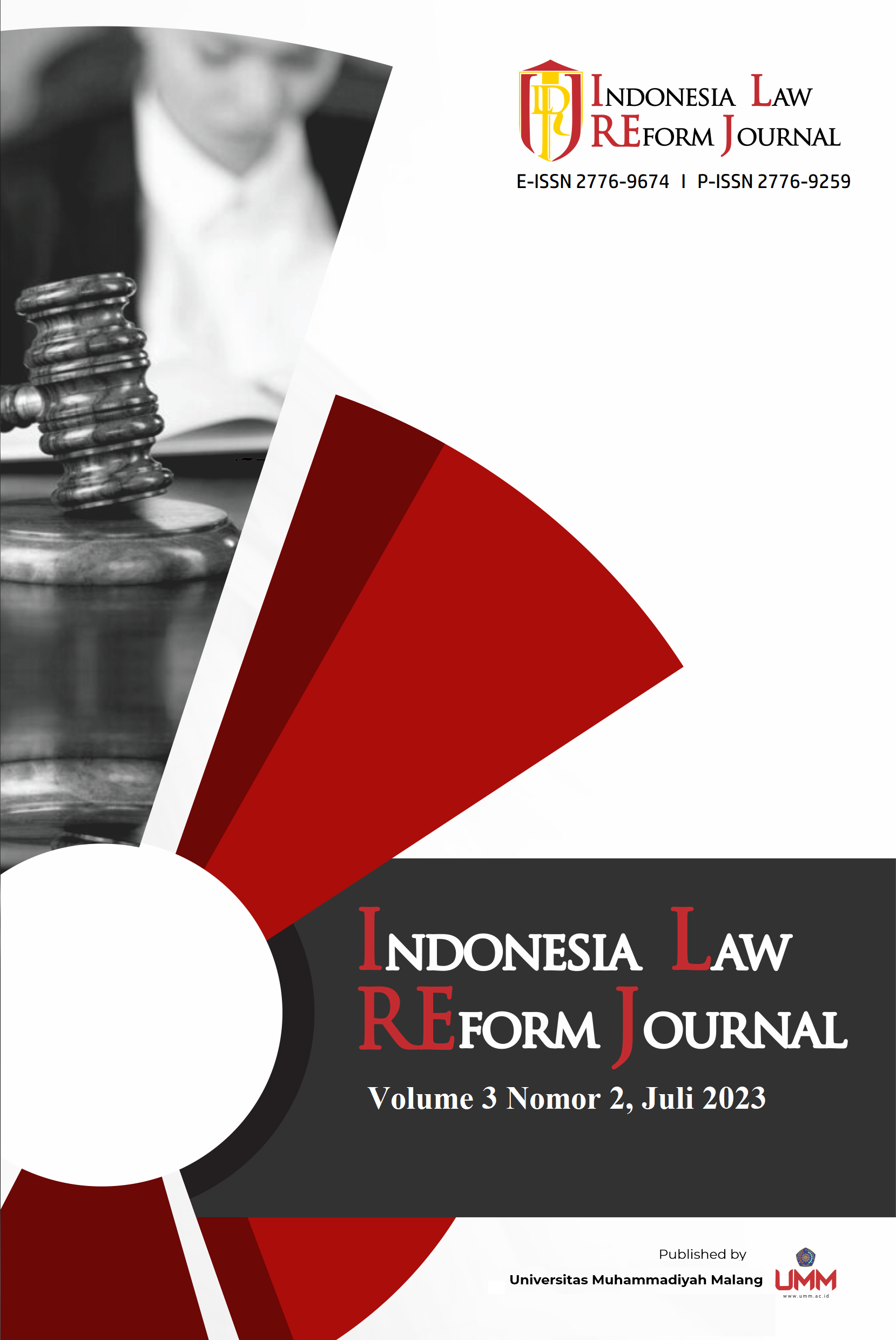Enforcement of Nationality Principle: A Basic Approach for Human Right Protection
DOI:
https://doi.org/10.22219/ilrej.v3i2.29709Keywords:
Nationality PrincipleAbstract
Abstract
This research is a study of international law principle, namely the nationality principle. This principle is generally used to support obligation of state to provide protection to its citizens wherever they may be. As international relations have evolved, the interactions of citizens with other countries have also increased, often resulting in citizens facing legal issues in foreign countries. In line with this, a review of references related to the protection of human dignity as a fundamental aspect of international law through the enforcement of the nationality principle was carried out. The research method used in this study is qualitative, involving an approach to regulations in the form of multilateral, regional, and even bilateral international agreements. This approach is further supported by conceptual interpretations of general legal principles and the resolution of cases related to the application of these principles. The study results show that the enforcement of the nationality principle is one form of human rights protection in international relations. This is based on respect for human dignity and is only applied to specific crimes, different legal systems among countries, and global peace and security within the context of healthy state relations as well. Therefore, this article provides recommendations for improving cooperation among states, including a review of extradition agreements between countries, where its implementation is incapacitated.
Abstrak
Penelitian ini berupa kajian terhadap salah satu asas dalam hukum internasional yakni nationality principle atau asas kebangsaan. Prinsip ini pada umumnya digunakan untuk mendukung kewajiban negara dalam memberikan perlindungan terhadap warga negara nya dimanapun mereka berada. Seiring berkembangnya hubungan antar negara sehingga interaksi warga negara pun semakin berkembang, seringkali berdampak pada warga negara berhadapan dengan hukum di negara lain. Maka sejalan dengan hal tersebut, dilakukan penelusuran referensi terkait perlindungan martabat manusia sebagai hal yang fundamental bagi setiap individu dalam persepktif hukum internasional melalui penegakan prinsip nationality. Metode yang digunakan adalah metode penelitian kualitatif, dengan melakukan pendekatan terhadap aturan berupa perjanjian internasional bersifat multilateral, regional bahkan bilateral, kemudian didukung dengan penafsiran secara konseptual terhadap prinsip hukum umum serta penyelesaian kasus-kasus yang berkaitan dengan penerapan prinsip-prinsip tersebut. Hasil study menunjukan bahwa penegakan terhadap prinsip kebangsaan menjadi salah satu bentuk perlindungan HAM dalam pergaulan internasional, hal ini didasari pada penghormatan terhadap martabat manusia, hanya diberlakukan pada kejahatan-kejahatan tertentu, system hukum yang berbeda antar negara, dan perdamaian dan kemanan dunia dalam konteks relasi yang sehat antar negara. Maka, artikel ini memberikan rekomendasi pada peningkatan Kerjasama antar negara salah satunya peninjauan Kerjasama perjanjian ekstradisi antar negara yang pada faktanya masih lemah dalam aspek implementasi.
Downloads
References
Aduku, Oshoma. “State Diplomatic Protection for Citizens With Dual Nationality (Case Study of Nnamdi Kanu, Nigerian and British National).” SSRN Electronic Journal, 2021. https://doi.org/10.2139/ssrn.3880777.
Ahmad, Jumal. “Desain Penelitian Analisis Isi (Content Analysis).” Jurnal Analisis Isi 5, no. 9 (2018): 1–20. https://doi.org/10.13140/RG.2.2.12201.08804.
Brodersen, Kei Hannah, Nadja Capus, and Damian Rosset. “The Politics of Informality in Criminal Procedures.” International Journal of Law, Crime and Justice 74, no. June (2023): 100612. https://doi.org/10.1016/j.ijlcj.2023.100612.
Cantú Rivera, Humberto. “Developments in Extraterritoriality and Soft Law: Towards New Measures to Hold Corporations Accountable for Their Human Rights Performance?” Anuario Mexicano de Derecho Internacional 14, no. June (2014): 727–63. https://doi.org/10.1016/S1870-4654(14)70020-0.
Christian Reus-Smit. Politik Hukum Internasional. Edited by Derta Sri Widowatie; Irfan M Zaki. Terjemahan. Bandung: Nusamedia, 2015.
Crystallography, X-ray Diffraction. 済無No Title No Title No Title, 2016.
Georgi, F. Richard. “Peace through the Lens of Human Rights: Mapping Spaces of Peace in the Advocacy of Colombian Human Rights Defenders.” Political Geography 99, no. November (2022): 102780. https://doi.org/10.1016/j.polgeo.2022.102780.
Gozzi, Gustavo. Rechtsstaat and Individual Rights in German Constitutional History. Law and Philosophy Library. Vol. 80, 2007. https://doi.org/10.1007/978-1-4020-5745-8_5.
Hayashi, Nobuo. Introduction To International Criminal Law. TerAs Law Review : Jurnal Hukum Humaniter Dan HAM. Vol. 4, 2019. https://doi.org/10.25105/teras-lrev.v4i7.5430.
Jardón, Luis. “The Interpretation of Jurisdictional Clauses in Human Rights Treaties.” Anuario Mexicano de Derecho Internacional 13, no. 13 (2013): 99–143. https://doi.org/10.1016/s1870-4654(13)71040-7.
Kickbusch, Ilona, and Austin Liu. “Global Health Diplomacy—Reconstructing Power and Governance.” The Lancet 399, no. 10341 (2022): 2156–66. https://doi.org/10.1016/S0140-6736(22)00583-9.
Kolb, Robert. Peremptory International Law (Jus Cogens), 2015.
Law, Cyber. “Ancasila And” 3, no. 1 (2022): 15–30.
Nurvianti, Dewi, and Fathurrahman. “Perlindungan Melalui Notifikasi Konsuler Bagi Pekerja Migran Indonesia Di Arab Saudi ( Kasus Eksekusi Mati Tanpa Pemberitahuan ).” Fakultas Hukum, Universitas Borneo Tarakan 32 (2020): 422–35.
O’Grady, Nathaniel, and Duncan Shaw. “Resilience, Responsibility and State Abandon: The Changing Role of the Government in Emergencies.” Political Geography 100, no. November 2022 (2023): 102796. https://doi.org/10.1016/j.polgeo.2022.102796.
Pasternak, Shiri, Deborah Cowen, Robert Clifford, Tiffany Joseph, Dayna Nadine Scott, Anne Spice, and Heidi Kiiwetinepinesiik Stark. “Infrastructure, Jurisdiction, Extractivism: Keywords for Decolonizing Geographies.” Political Geography 101, no. December 2022 (2023): 102763. https://doi.org/10.1016/j.polgeo.2022.102763.
Pérez-León Acevedo, Juan Pablo. “The Close Relationship between Serious Human Rights Violations and Crimes against Humanity: International Criminalization of Serious Abuses.” Anuario Mexicano de Derecho Internacional 17, no. 1 (2017): 145–86. https://doi.org/10.22201/iij.24487872e.2017.17.11034.
Razin, Assaf. “Understanding National-Government Policies Regarding Globalization : A Trade-Finance Analysis.” Journal of Government and Economics 8, no. December 2022 (2023): 100060. https://doi.org/10.1016/j.jge.2023.100060.
Regilme, Salvador Santino F. “Contested Spaces of Illiberal and Authoritarian Politics: Human Rights and Democracy in Crisis.” Political Geography 89, no. May 2020 (2021): 102427. https://doi.org/10.1016/j.polgeo.2021.102427.
Rijali, Ahmad. “Analisis Data Kualitatif.” Alhadharah: Jurnal Ilmu Dakwah 17, no. 33 (2019): 81. https://doi.org/10.18592/alhadharah.v17i33.2374.
Rodrigues, Rowena. “Legal and Human Rights Issues of AI: Gaps, Challenges and Vulnerabilities.” Journal of Responsible Technology 4, no. October (2020): 100005. https://doi.org/10.1016/j.jrt.2020.100005.
Sabates-Wheeler, Rachel, and Jeremy P. Barker. “The Place of Religious Inequalities within International Development and Humanitarian Response Frameworks: Lessons from Iraq.” World Development 173, no. October 2023 (2024): 106417. https://doi.org/10.1016/j.worlddev.2023.106417.
Sánchez de Tagle, Gonzalo. “The Objective International Responsibility of States in the Inter-American Human Rights System.” Mexican Law Review 7, no. 2 (2015): 115–33. https://doi.org/10.1016/s1870-0578(16)30005-1.
Shaw, Malcom N. “International Law 8th Edition.” Angewandte Chemie International Edition, 6(11), 951–952., 2017, 1124.
Stephen, C. H.Ng. “The Role of Perceived Organizational Supports and Management Nationality amid Physical Workplace’s Planned Quality Change.” Asia Pacific Management Review 28, no. 2 (2023): 132–45. https://doi.org/10.1016/j.apmrv.2022.07.004.
Surwandono, S, and Ariyanto Nugroho. “Mengevaluasi Kebijakan Diplomasi Perlindungan WNI Melalui Paradgma ‘Duty of Care’ [Evaluating Indonesia’s Diplomacy Policy for The Protection of Indonesian Citizens Abroad Through The ‘Duty of Care’ Paradigm].” Jurnal Politica Dinamika Masalah Politik Dalam Negeri Dan Hubungan Internasional 13, no. 2 (2023): 260–75. https://doi.org/10.22212/jp.v13i2.3499.
Szczucki, Krzysztof. “Ethical Legitimacy of Criminal Law.” International Journal of Law, Crime and Justice 53, no. March (2018): 67–76. https://doi.org/10.1016/j.ijlcj.2018.03.002.
Téllez Carvajal, Evelyn. “The Political Rights of Mexican Migrants: Nationality and Citizenship in Mexico.” Mexican Law Review 6, no. 1 (2013): 177–98. https://doi.org/10.1016/s1870-0578(16)30023-3.
Downloads
Published
How to Cite
Issue
Section
License
Copyright (c) 2023 Dewi Nurvianti, Tinuk Dwi Cahyani

This work is licensed under a Creative Commons Attribution-ShareAlike 4.0 International License.











